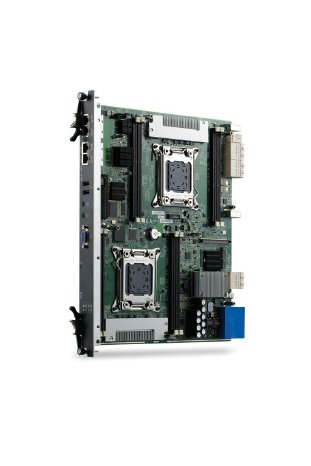The aTCA-6250 is designed for carrier-grade applications requiring maximum computing power, reliability and high network/storage throughput such as media servers in IPTV, IP Multimedia Subsystem (IMS) broadband networks, network security, network monitoring/analysis and wireless infrastructures. ADLINK's latest ATCA blade is designed for NEBS compliance and gives telecom equipment manufacturers (TEMs) and network equipment providers (NEPs) a powerful, high bandwidth solution for mission critical applications and a smooth, reliable path for scalability and upgradability.
The aTCA-6250 implements dual Intel® Xeon® processor E5-2658 and E5-2648L-based devices linked by dual Intel® Quickpath Interconnect (Intel® QPI) point-to-point link interfaces providing high bandwidth, low latency connectivity from processor to processor at up to 8 GT/s. With Intel® Hyper-Threading Technology and Intel® Turbo Boost Technology, the Intel® Xeon® processor E5-2658 and E5-2648L provides increased performance from both single and multi-thread workloads while maintaining thermal and energy efficiency. Eight sockets of DDR3-1600 VLP RDIMM offer a maximum capacity of 128 GB of main memory. The memory design of the aTCA-6250 is optimized for maximum memory bandwidth and provides forward compatibility with next generation DDR3-1866 memory supported by future Intel® CPU designs.
High speed data-transfer on the PICMG 3.1 Fabric Interface is enabled by a PCI Express 2.0 capable Intel® 82599EB 10GbE controller and Base Interface connectivity is provided by PCI Express 2.0 capable Intel® 82576EB GbE controllers. Paired with the optional aTCA-R6270 RTM, the aTCA-6250 supports additional dual 10GbE SFP+ ports enabled by an Intel® 82599ES 10GbE controller.
"Combined with Intel® Xeon® processor E5-2658 and E5-2648L, the aTCA-6250 delivers powerful performance for high-end telecom, network security and media server applications requiring carrier-grade computing power, memory bandwidth/capacity, high throughput connectivity and accelerated packet processing," said Eric Kao, Director of ADLINK's Embedded Computing Product Segment. "The ADLINK aTCA-6250 is powered by a 400 W power supply subsystem to ensure uncompromised computing performance. ADLINK's advanced thermal solution guarantees stability and longevity for operation in critical environments at maximum performance," continued Eric Kao.
"ADLINK's new aTCA-6250 offers versatile storage and connectivity support with four RJ-45 GbE ports, two USB 2.0 ports, two serial ports and analog graphics output on the front panel; onboard SATA DOM socket, Fabric Interface protocols and Base Interface channels to Zone 2; and dual hot-swappable SAS bays, three USB ports, one serial port and two SFP+ 10 GbE ports on the aTCA-R6270 RTM. Combining high computing performance, high memory capacity/bandwidth and high bandwidth of network and storage I/O interface, the ADLINK's aTCA-6250 is specifically designed for extreme high-end telecom applications."
The aTCA-6250 supports the Intel® Data Plane Development Kit (Intel® DPDK), a lightweight run-time environment for Intel® architecture processors offering low overhead and run-to-completion mode to maximize packet processing performance. It provides a rich selection of optimized and efficient libraries, also known as the Environment Abstraction Layer (EAL), which are responsible for initializing and allocating low-level resources, hiding the environment specifics from the applications and libraries, and gaining access to the low-level resources, such as memory space, PCI devices, timers and consoles.
The EAL provides an optimized Poll Mode Driver (PMD); memory & buffer management; and timer, debug and packet handling APIs, some of which may also be provided by the operating system. To facilitate interaction with application layers, the EAL, together with standard the GNU C Library (GLIBC), provide full APIs for integration with higher level applications.
The aTCA-6250 provides future support for accelerated packet processing capability via an optional mezzanine card which will be available in Q4, 2012 that will feature a future generation communications platform from Intel enabling workload consolidation across the control and dataplanes. Support for Intel® QuickAssist Acceleration Technology will provide optimized packet and network capabilities by offloading tasks to the mezzanine card, freeing up CPU resources.
For more information, please go to http://www.adlinktech.com/....
ADLINK Technical White Paper : Consolidating Packet Forwarding Services on the ADLINK aTCA-6200 Blade with the Intel® DPDK

